北京市第七中学人教版高中英语必修五课件:Unit1 Great scientists Warming up(共30张PPT)
文档属性
| 名称 | 北京市第七中学人教版高中英语必修五课件:Unit1 Great scientists Warming up(共30张PPT) |
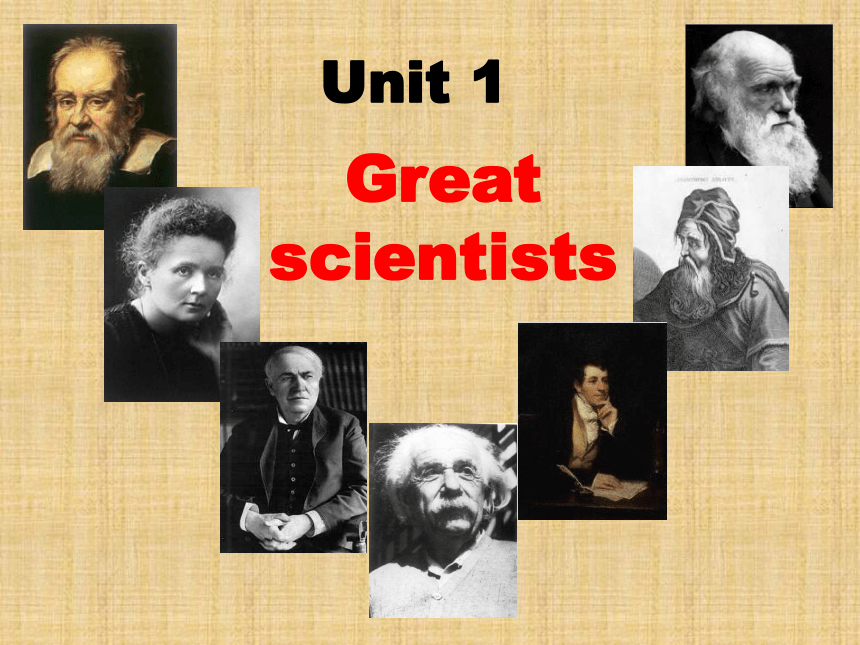
|
|
| 格式 | zip | ||
| 文件大小 | 1.8MB | ||
| 资源类型 | 教案 | ||
| 版本资源 | 人教版(新课程标准) | ||
| 科目 | 英语 | ||
| 更新时间 | 2015-12-03 00:00:00 | ||
图片预览

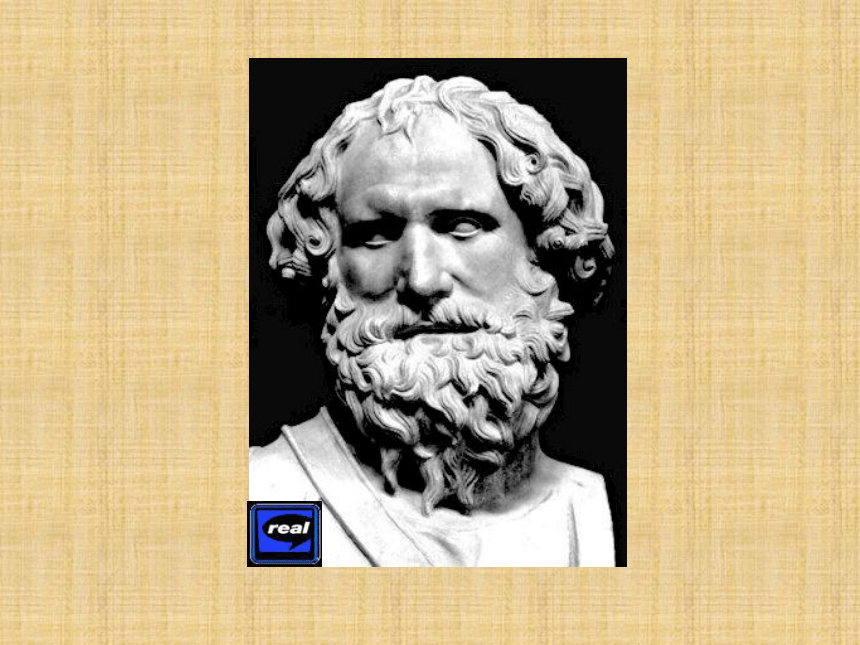
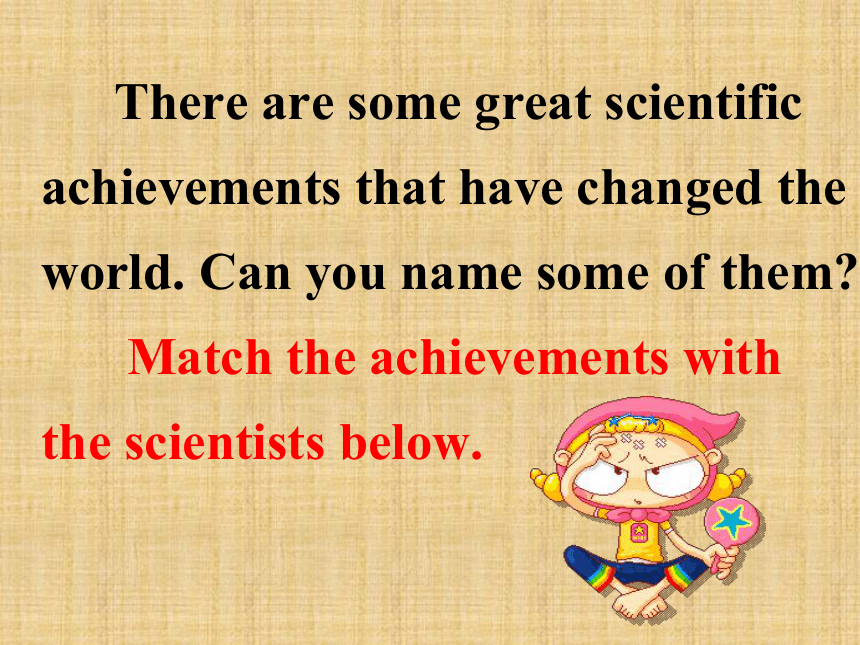
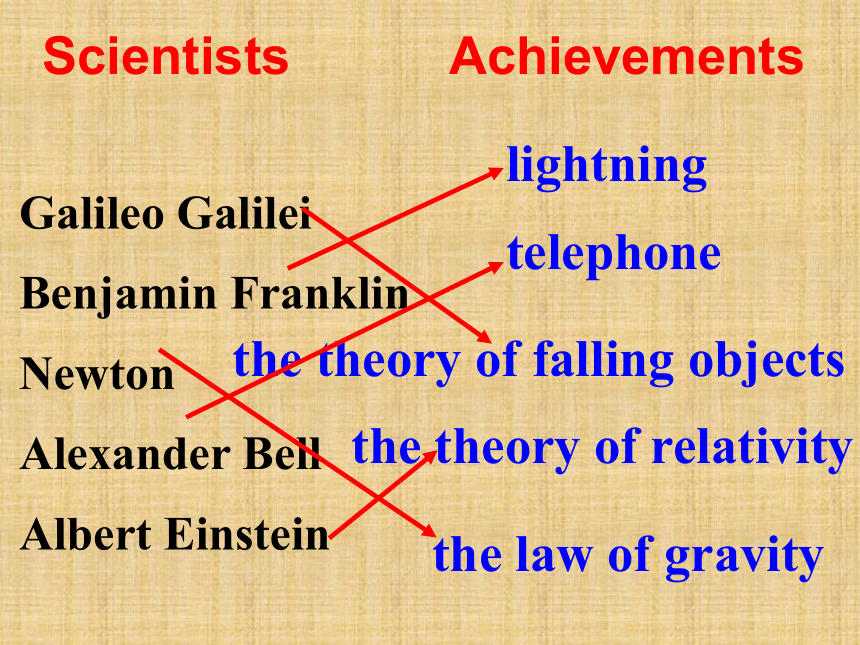
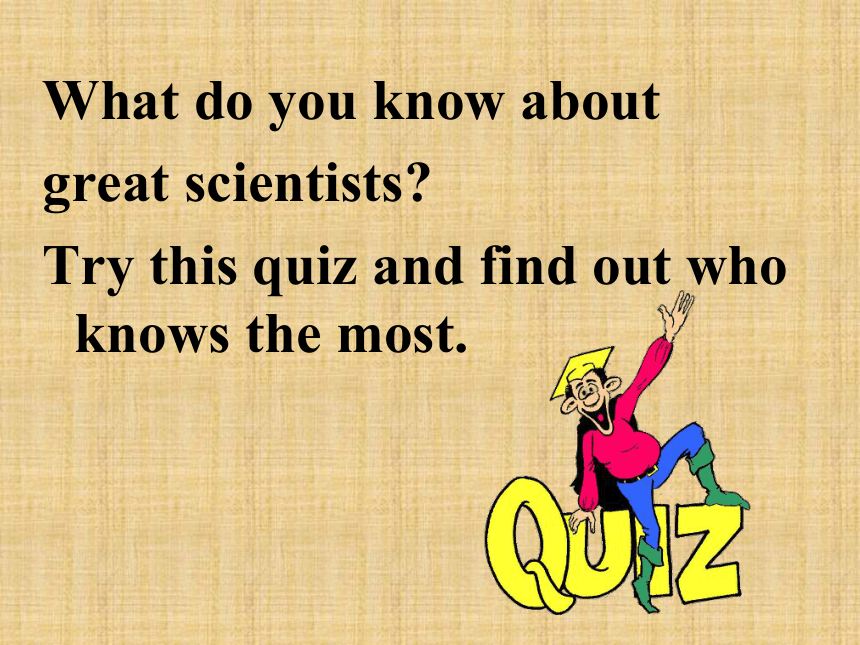
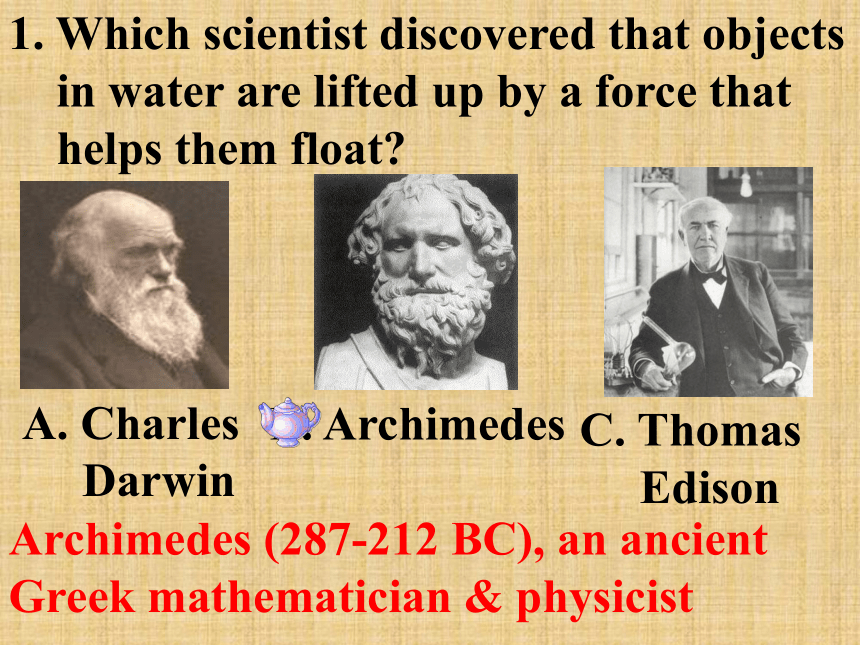
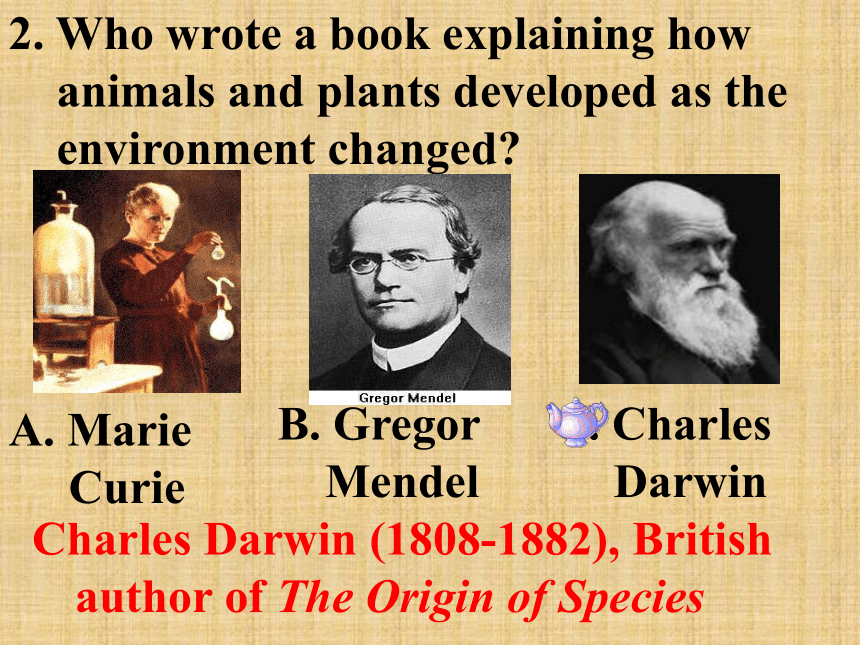
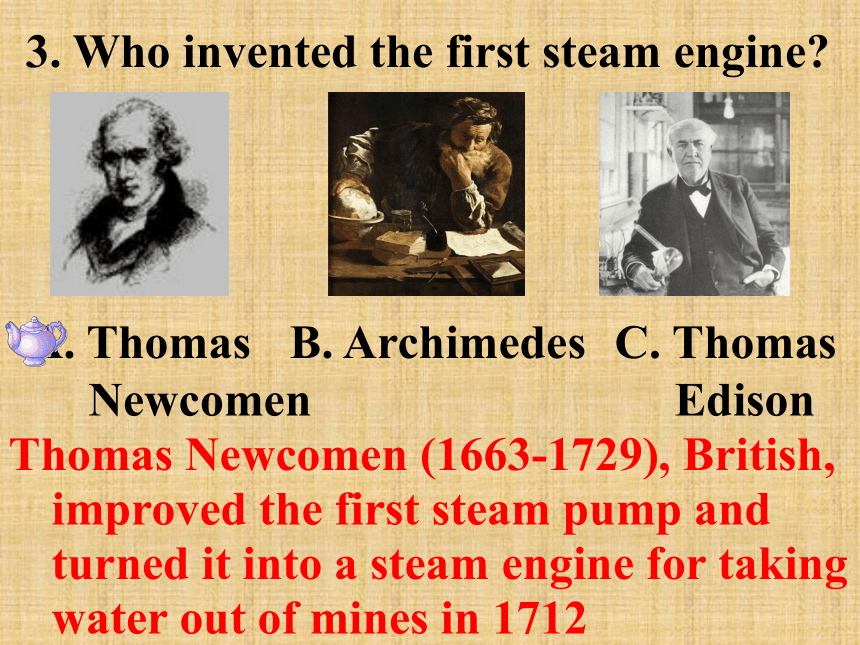
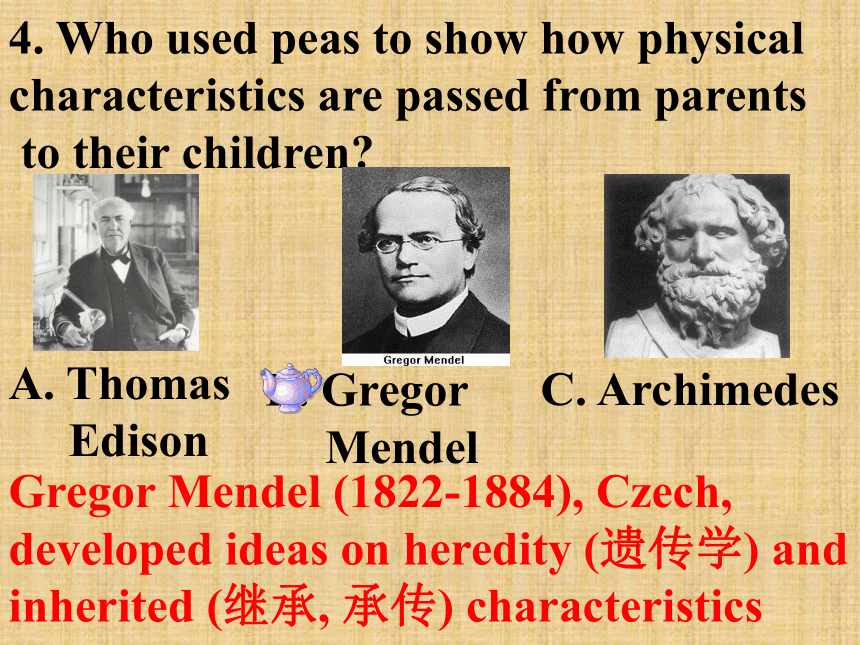
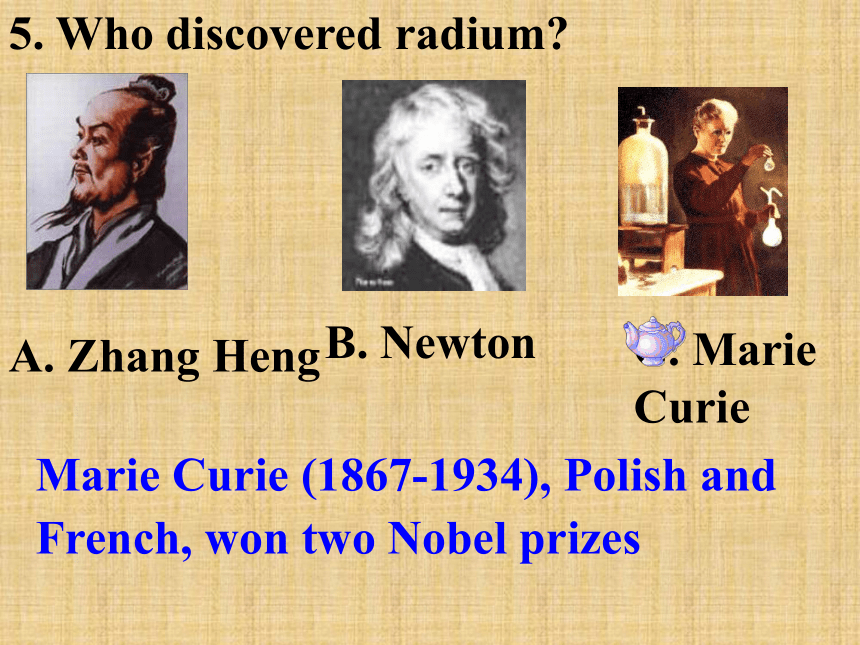
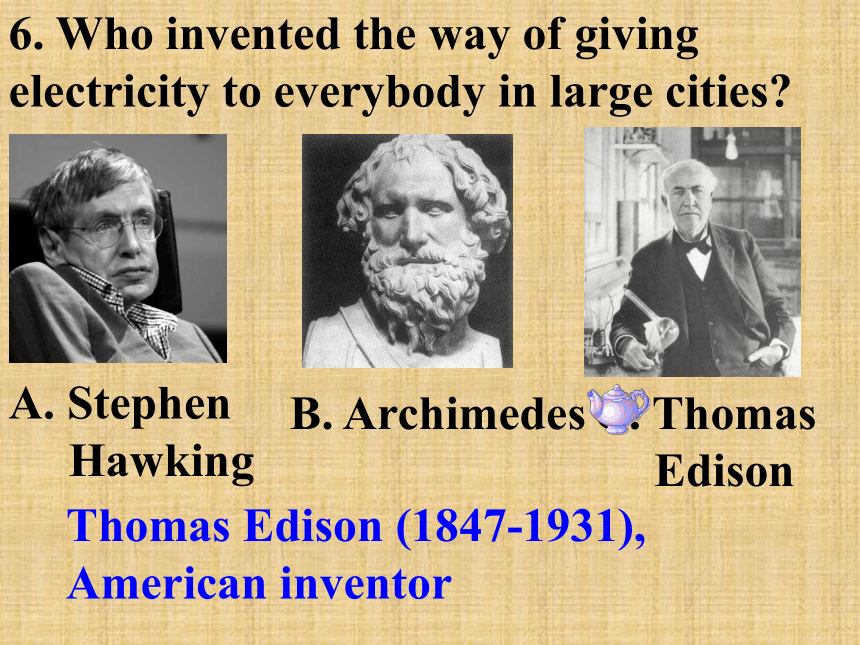
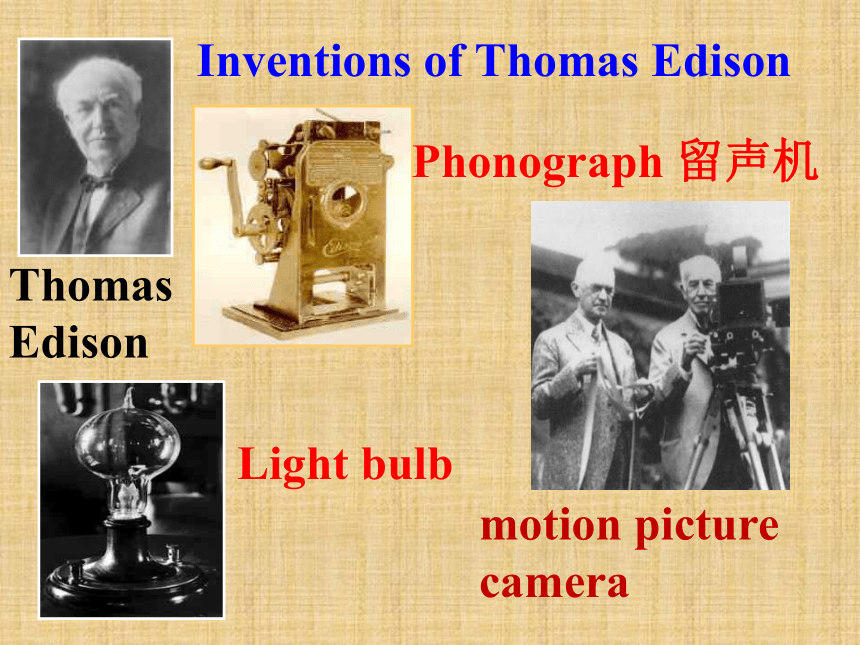
文档简介
课件30张PPT。Unit 1Great
scientists There are some great scientific achievements that have changed the world. Can you name some of them?
Match the achievements with the scientists below. Galileo Galilei
Benjamin Franklin
Newton
Alexander Bell
Albert Einsteinthe theory of falling objectslightningthe law of gravitytelephone Scientists Achievementsthe theory of relativityWhat do you know about
great scientists?
Try this quiz and find out who knows the most.1. Which scientist discovered that objects
in water are lifted up by a force that
helps them float?B. ArchimedesC. Thomas
EdisonA. Charles
DarwinArchimedes (287-212 BC), an ancient Greek mathematician & physicist2. Who wrote a book explaining how
animals and plants developed as the
environment changed? Marie
CurieC. Charles
DarwinB. Gregor
MendelCharles Darwin (1808-1882), British author of The Origin of Species 3. Who invented the first steam engine? Thomas
NewcomenC. Thomas
EdisonB. ArchimedesThomas Newcomen (1663-1729), British, improved the first steam pump and turned it into a steam engine for taking water out of mines in 17124. Who used peas to show how physical characteristics are passed from parents
to their children? Thomas
EdisonC. ArchimedesB. Gregor
MendelGregor Mendel (1822-1884), Czech, developed ideas on heredity (遗传学) and inherited (继承, 承传) characteristics5. Who discovered radium?C. Marie CurieB. NewtonA. Zhang HengMarie Curie (1867-1934), Polish and French, won two Nobel prizes6. Who invented the way of giving electricity to everybody in large cities? Stephen
Hawking C. Thomas
EdisonB. ArchimedesThomas Edison (1847-1931),
American inventorThomas
EdisonInventions of Thomas Edison Phonograph 留声机Light bulbmotion picture camera7. Who was the painter that studied dead
bodies to improve his painting of people? Gregor
MendelC. Marie
Curie B. Leonardo
da Vinci Leonardo da Vinci (1452-1519), Italian artistLeonardo da Vinci’s paintings 8. Who invented a lamp to keep miners safe underground? Sir Humphry
Davy C. FaradayB. Thomas
NewcomenSir Humphry Davy (1778-1829), British,
discovered the medicinal value of nitrous oxide (一氧化二氮) as anaesthetic (麻醉剂)9. Who invented the earliest instrument to tell people where earthquakes happened? Charles
DarwinC. Watt B. Zhang
HengZhang Heng (78-139), Chinese, invented the first seismographseismograph地动仪10. Who put forward a theory about black holes? Stephen
HawkingC. CopernicusB. ArchimedesStephen Hawking (1942- ), British scientist, worked in astronomy and studied black holes in spaceThe quotes below are from some famous scientists.
Do you know their meanings?Imagination is more important than
knowledge.“想象力比知识更重要。”Albert EinsteinGenius is one percent inspiration and ninety-nine percent perspiration.“天才就是百分之九十九的汗水
加上百分之一的灵感。”Thomas Alva EdisonWhat makes a
scientist successful?strong willimaginationcreativitypatiencepersistencecarefulnesscuriosity…What disease spread around the world in 2003?SARSWhat other infectious diseases do you know?bird fluH7N9Hand-foot-mouth disease (HFMD) Infectious diseases can be spread
to other people. They have an unknown
cause and need public health care to
solve them.
People may be exposed to infectious
diseases, so may animals. Bird flu,
AIDS and SARS are infectious diseases.
Infectious diseases are difficult to cure. What do you know about infectious diseases?What do you know about cholera?What other diseases do you know are similar to SARS today?choleraCholera:
It begins in the stomach and a severe case can lead to death without immediate treatment.
.And the victims died very quickly from a loss of liquid after severe vomiting(呕吐) and diarrhoea(腹泻).Reading
scientists There are some great scientific achievements that have changed the world. Can you name some of them?
Match the achievements with the scientists below. Galileo Galilei
Benjamin Franklin
Newton
Alexander Bell
Albert Einsteinthe theory of falling objectslightningthe law of gravitytelephone Scientists Achievementsthe theory of relativityWhat do you know about
great scientists?
Try this quiz and find out who knows the most.1. Which scientist discovered that objects
in water are lifted up by a force that
helps them float?B. ArchimedesC. Thomas
EdisonA. Charles
DarwinArchimedes (287-212 BC), an ancient Greek mathematician & physicist2. Who wrote a book explaining how
animals and plants developed as the
environment changed? Marie
CurieC. Charles
DarwinB. Gregor
MendelCharles Darwin (1808-1882), British author of The Origin of Species 3. Who invented the first steam engine? Thomas
NewcomenC. Thomas
EdisonB. ArchimedesThomas Newcomen (1663-1729), British, improved the first steam pump and turned it into a steam engine for taking water out of mines in 17124. Who used peas to show how physical characteristics are passed from parents
to their children? Thomas
EdisonC. ArchimedesB. Gregor
MendelGregor Mendel (1822-1884), Czech, developed ideas on heredity (遗传学) and inherited (继承, 承传) characteristics5. Who discovered radium?C. Marie CurieB. NewtonA. Zhang HengMarie Curie (1867-1934), Polish and French, won two Nobel prizes6. Who invented the way of giving electricity to everybody in large cities? Stephen
Hawking C. Thomas
EdisonB. ArchimedesThomas Edison (1847-1931),
American inventorThomas
EdisonInventions of Thomas Edison Phonograph 留声机Light bulbmotion picture camera7. Who was the painter that studied dead
bodies to improve his painting of people? Gregor
MendelC. Marie
Curie B. Leonardo
da Vinci Leonardo da Vinci (1452-1519), Italian artistLeonardo da Vinci’s paintings 8. Who invented a lamp to keep miners safe underground? Sir Humphry
Davy C. FaradayB. Thomas
NewcomenSir Humphry Davy (1778-1829), British,
discovered the medicinal value of nitrous oxide (一氧化二氮) as anaesthetic (麻醉剂)9. Who invented the earliest instrument to tell people where earthquakes happened? Charles
DarwinC. Watt B. Zhang
HengZhang Heng (78-139), Chinese, invented the first seismographseismograph地动仪10. Who put forward a theory about black holes? Stephen
HawkingC. CopernicusB. ArchimedesStephen Hawking (1942- ), British scientist, worked in astronomy and studied black holes in spaceThe quotes below are from some famous scientists.
Do you know their meanings?Imagination is more important than
knowledge.“想象力比知识更重要。”Albert EinsteinGenius is one percent inspiration and ninety-nine percent perspiration.“天才就是百分之九十九的汗水
加上百分之一的灵感。”Thomas Alva EdisonWhat makes a
scientist successful?strong willimaginationcreativitypatiencepersistencecarefulnesscuriosity…What disease spread around the world in 2003?SARSWhat other infectious diseases do you know?bird fluH7N9Hand-foot-mouth disease (HFMD) Infectious diseases can be spread
to other people. They have an unknown
cause and need public health care to
solve them.
People may be exposed to infectious
diseases, so may animals. Bird flu,
AIDS and SARS are infectious diseases.
Infectious diseases are difficult to cure. What do you know about infectious diseases?What do you know about cholera?What other diseases do you know are similar to SARS today?choleraCholera:
It begins in the stomach and a severe case can lead to death without immediate treatment.
.And the victims died very quickly from a loss of liquid after severe vomiting(呕吐) and diarrhoea(腹泻).Reading
